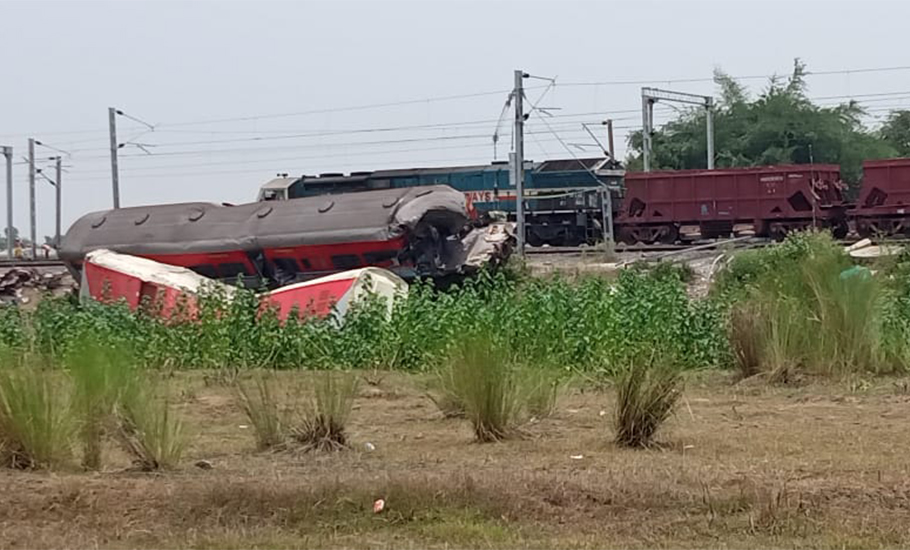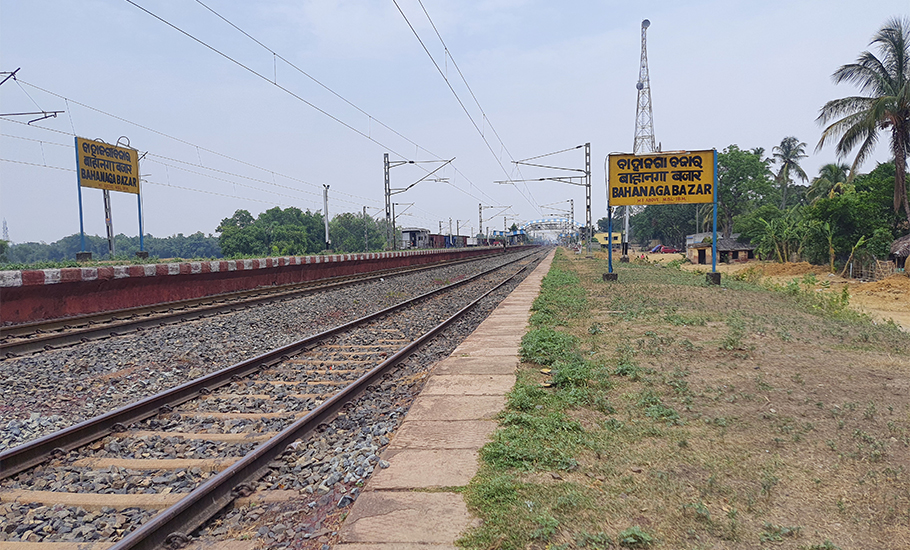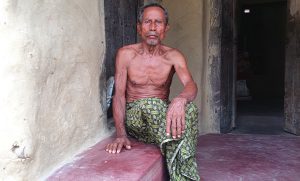
Odisha accident site, a week later: Trains have moved on, locals have not

“Aap ke pass extra face mask hey tho please dijiye, mask ke bina raha nahin jaata.” (If you have an extra face mask, please give me, it’s difficult to be here without one.)
The Railway Protection Force (RPF) constable’s appeal to his colleague manning a road leading to the Odisha rail accident site does not surprise any. Such is the foul smell still emanating from near the Bahanaga Bazar railway station where the June 2 accident involving two passenger trains and a freight train took place that even residents find it near impossible to cope.
The grisly tragedy left at least 288 passengers dead and hundreds injured in one of the worst disasters in Indian railway history.

RPF teams from Kharagpur have been deployed at different points. All sides around the station area are cordoned off. Private vehicles and individuals are stopped at least over 300 m away. Only government vehicles are allowed inside the zone.
Repair work
Villagers say that with repair jobs and investigation into the tragedy still on, the road and the station will be out of bounds for people for some more days. Hundreds of workers can be seen from a distance, busily working on and along the rail tracks. A goods train stands stationary.
A few tractors carrying garbage from the accident site make their way out. Instantly, people present in shops in the vicinity and also journalists cover their nose with their hands.
Originating from National Highway 16, the narrow concrete road, flanked by shops on either side, is used by locals to commute between Bahanaga and Gopalpur, separated by a few kilometers and the railway tracks.
Watch: Odisha train crash: Families look for the right body amid confusion
An autorickshaw approaching the road is stopped. A couple of women with three children in it are going to their relatives to be part of a three-day Raja (a famous festival for girls in Odisha) starting on June 13.
The women wonder how they can reach Gopalpur in view of the security measures.
Diverting traffic
They are told that they have to either walk through nearby fields, cross the tracks and cover the distance on foot or take the autorickshaw through another route.
A detour will cost them Rs 100 extra. The two have a quick discussion and minutes later their vehicle takes a U-turn and leaves.
Roughly 400 m to the south of the station, Anu Das, 35, her son and daughter, both minors, are waiting under a tree by the rail line. Her husband, a support staff under a contractor, is on duty on the Bhubaneswar-New Delhi Rajdhani Express that is expected to pass through the route in a few minutes.
“My husband just called to say the train has reached Soro station, a few minutes away,” says Anu.
Soon, the Rajdhani Express whistles in. It is in slow motion as work is in progress on the rail lines. All of a sudden, the children point their fingers at a man standing at the door of a coach and shout: “Bapa (father) is there!”
An equally beaming man waves his hands. The children reciprocate till the last coach goes past them. The spectacle, though for a few fleeting seconds, is filled with pure innocence and emotion.
Soon, Anu collects a packet containing some money and toffees for the children which her husband has dropped near the tracks next to where she was standing.
“The month has begun and he knows we will need the money. I will manage my house with this amount till he gets leave and visits us, hopefully in a week or two,” she shares and walks back home.
Bloody tragedy
No one in the area has forgotten what happened on June 2.
Well before the administration reached the accident site, hundreds of men, women and young people from nearby villages — Bahanaga, Kamaripur, Ichhapur, Daradia and Krushnapur – rushed to the spot. Displaying amazing commitment and courage, they saved scores of lives.
Anu, too, was among the rescuers. For four hours from 7.30 pm, she was busy wiping the face of the injured with the wet clothes she had carried from home.
She recalls that local women offered water to the shaken passengers who had escaped with minor injuries. Some even brought sarees from their houses for women passengers whose clothes had gotten torn.
While Anu was at the station, her 10th Class daughter and NCC cadet Snehalata attended several of the injured brought to the Bahanaga Government High School next to the national highway where she studies.
“We 16 cadets — eight boys and eight girls — did whatever job was assigned to us,” recounts Snehalata. Her aim is to pursue ITI and become a loco pilot. “The job offers sheer excitement and also an assured future,” she explains.
At home, Snehalata’s grandfather Purna Chandra, 74, still can’t imagine that the station which has been a part of his life for over 62 years when he sold tea as a teenager would ever witness such terrible misery.

“It’s difficult to believe,” intones Das as the goods train whistles. “The repair works will go on for a few more days.”
Emotions die hard
For the moment, his neighbours are bothered about the stench emanating from the accident spot where a few damaged coaches lie here and there.
In the daytime, the sweltering heat accompanying the unbearable humidity keeps them confined to their homes. The problem, however, starts when there is power outage in the evening and they come out.
Also read: Odisha train tragedy: Why was Coromandel Express’ Point 17-A set for the loop line?
“Instead of the soothing occasional breeze, the foul smell forces us inside,” complains a woman.
The villagers think there could possibly be some more decomposed bodies at the accident site. They have no option but to put up with the aftershocks of the horrific tragedy — at least for some more days.
As Sudhansu Panda of Bahanaga says: “Just because a train or two has begun running on the tracks doesn’t mean it has become normal. Normalcy may arrive soon but the emotional scars will live on. For us, life will never be the same again.”


